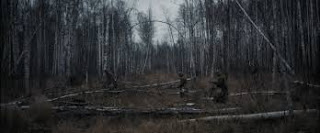I wouldn't recommend Denes Nagy's new film Natural Light (Termeszetes Feny) for a date night. Horses struggling in huge puddles of mud, elderly prisoners of war are abused and humiliated, women are threatened with rape, and 'partisans' and 'traitors' are tortured and hanged in grey dreary forests in remote parts of Ukraine.
Natural Light takes place in a physical quagmire - but each and every character in it is living in their own personal quagmire too. We are nearing the end of World War II and Hungary has, fatefully and shamefully, thrown in its lot with the Axis powers, believing them to be the most likely victors of the war.
Hungarian troops have been sent to Ukraine to hold the territory, keep the locals in order, and, more than anything, root out any partisans that happen to be hiding in the crude wooden huts that pass as homes in this region.
Chief among them is Istvan Semetka (Ferenc Szabo). Semetka's face is lined, and haunted, by the horrors he's seen, the horrors his men have dished out, and the horrors he has turned a blind eye too. He is taciturn, morally ambivalent - though there is a suggestion that, once, there was a conscience, and as he wades ever deeper into the grim forests of Ukraine he seems, also, to be travelling into the deepest and darkess recesses of his psyche.
Natural Light features lots of long, even boring, scenes of rafts floating quietly down rivers, trees with glimmers of sunlight piercing them, horses, horses eyes, malnourished peasants chained to the wall, and, most of all, Semetka staring unemotionally into the void. The void that his actions have helped create.
When a group of partisans escape, Semetka is temporarily relieved of his duties by his superior Koleszar (Laszlo Bajko). Koleszar is clearly a troubled man but, far worse, he is a troubling man. There is never any doubt in the film that all the aggressions carried out, both minor and major, are leading to one final act of horror and when that act comes it is as awful as anything could be.
Koleszar, of course, is the architect of this dreadful plan but Semetka, too, is not entirely free of guilt. Though he says nothing, we understand he is fully aware that his lack of action, his moral cowardice when he simply follows orders and respects the chain of command, are complicit in the tragedy. When later, he vaguely attempts to make amends it is hard to muster even a shred of sympathy for him and, for me, that was the problem with Natural Light.
Natural Light presents such a visceral, and bleak, critique of World War II - and wars in general - that there is barely a sympathetic character in it. The Ukrainian villagers, subdued and starving under the control of the fascists, aren't fleshed out well enough for us to really identify them as individuals, the rest of the Hungarian troops are mainly seen bullying both their colleagues and the Ukrainians, and neither Koleszar nor Semetka say a single word, or take a single action, that redeems the terrible decision Hungary made when they allied with the Nazis.
The sheer scale of the horror, the unrelenting bleakness of the film, made Natural Light an understandably tough watch - and that's fair enough, we shouldn't be glamourising war. But so numbed was I by this film that I felt virtually no emotion at all throughout its entirety - and that can't be right, surely. A sad indictment of Natural Light is that the only time I cried was when they showed the new John Lewis Christmas advert (the one with the alien) during the trailers. War, of course, is hell but, for me, to illustrate that you have to show at least some humanity. Natural Light, instead, presented humanity as a husk of its former self. This felt too much like what war is probably really like.








No comments:
Post a Comment